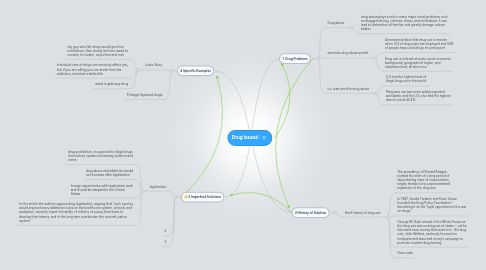
1. 3 Imperfect Solutions
1.1. legilazation
1.1.1. drug prohibition, as opposed to illegal drugs themselves, spawns increasing violence and crime
1.1.2. drug abuse and addiction would not increase after legalization
1.1.3. foreign experiments with legalization work and should be adopted in the United States
1.1.4. In this article the authors oppose drug legalization, arguing that "such a policy would impose heavy additional costs on the health care system, schools, and workplace, severely impair the ability of millions of young Americans to develop their talents, and in the long term overburden the criminal justice system."
1.2. 2
1.3. 3
2. 4 Specific Examples
2.1. Joshs Story
2.1.1. shy guy who felt drugs would give him confidence, then slowly led form weed to cocaine, to vicatin, oxycotton and met
2.1.2. individual case of drugs can seriously affect you, but if you are willing you can break from the addiction, and start a better life
2.1.3. weed is gate way drug
2.2. Portugal legalized drugs
3. 1. Drug Problems
3.1. Drug abuse
3.1.1. drug abuse plays a role in many major social problems such as drugged driving, violence, stress, and child abuse. It can lead to distraction of families and greatly damage unborn babies
3.2. americas drug abuse profile
3.2.1. Americans believe that drug use is remote when 3/4 of drug users are employed and 56% of people have used drugs at some point
3.2.2. Drug use is a threat at every social economic background, geographical region, and education level, all races too
3.3. u.s. lead world in drug abuse
3.3.1. U.S. has the highest level of illegal drug use in the world.
3.3.2. Marijuana use was more widely reported worldwide, and the U.S. also had the highest rate of use at 42.4%
4. 2 History of Solution
4.1. Brief history of drug war
4.1.1. The presidency of Ronald Reagan marked the start of a long period of skyrocketing rates of incarceration, largely thanks to his unprecedented expansion of the drug war.
4.1.2. In 1987, Arnold Trebach and Kevin Zeese founded the Drug Policy Foundation – describing it as the “loyal opposition to the war on drugs.”
4.1.3. George W. Bush arrived in the White House as the drug war was running out of steam – yet he allocated more money than ever to it. His drug czar, John Walters, zealously focused on marijuana and launched a major campaign to promote student drug testing.
4.1.4. New node
